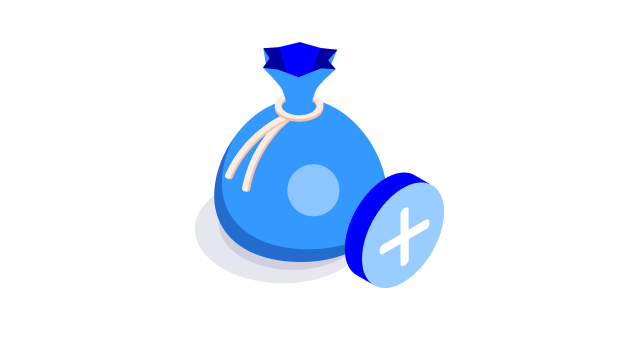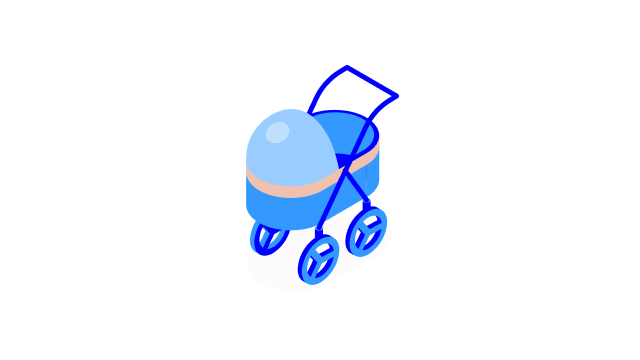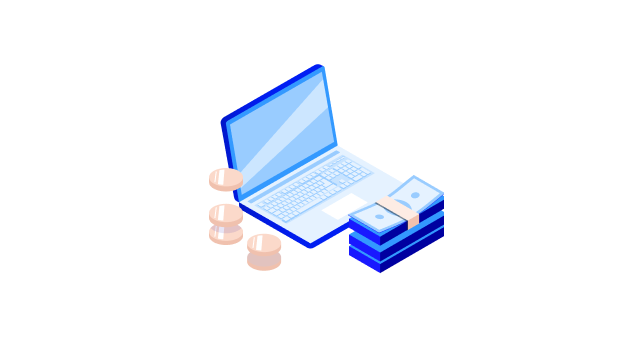- Why make an agreement to save monthly into a fund?
- If you make an agreement to save monthly into a fund and continue to save for at least three years, you may benefit from the effect of compounding. This means that you can earn a return not only on your initial investment but also on the return paid on it.
- One of the biggest gains of monthly saving is time diversification. By investing in funds each month with a long investment horizon, you’ll even out the effects of market fluctuations.
- Monthly saving does not commit you to anything or tie up your money. If life throws something unexpected your way, you always have the freedom to adjust your monthly savings plan. You can decide anytime to save more or less or stop saving altogether. You’ll have the money in your account in just a few days. And when the situation allows you to start again, you can always resume monthly saving.
By investing your savings into funds regularly, you will allow them to grow over time. Money held on a savings account gives you security, but if you invest it into funds, you may gain a better return in the long term.
- How much should I save in a month?
You can get started with as little as 10 euros a month. The rule of thumb is that, whenever possible, you should save 10% of your net income every month. You can adjust the sum if necessary. A typical customer saves about 100 euros a month, but an increasing number of customers vary the amount each month, depending on their current circumstances and available income.
Use our calculator to estimate how much your savings can grow over time. Try our savings calculator
- What is a good savings period?
In general, the time horizon recommended for fund and equity investors is at least five years, but you should think decades ahead – especially if you’re young – and turn regular saving into a habit.
You don’t need to know how you will spend the money when you start monthly saving. You may also withdraw your savings as necessary over the years, and if you need to sell fund units or shares, for example, you’ll have the money in your account in just a few days. By building up savings over a long period of time, you can often make even big dreams come true.
- Should I save into a fund or an account?
You should aim at keeping a buffer in your account to prepare for unexpected expenses. We recommend that the buffer corresponds to your income from about three months. A PerkAccount is a good option when you want to build a buffer: you will have unrestricted access to withdrawals and deposits. When your buffer starts to grow, you should also look into our FlexiDeposit Account, which offers better interest on your savings.
If you have a longer time horizon in mind, you should consider investment funds, as the expected return is higher on funds than on accounts in the long term.
Funds are managed by professionals, so you won’t need to monitor the markets or companies as closely as you would need to if you decided to invest directly in equities, for example.
- What would be a good fund for monthly saving?
The best way for you to find a suitable fund is to answer these questions first:
- What is the risk level you’re comfortable with? Are you willing to take a lot of risk or would you prefer a fund that is as risk-free as possible? The risk and return go hand in hand: the higher the risk, the higher the potential return. Just remember that risks may sometimes materialise and the value of your investments may decline.
- To reduce the risk, you need to diversify your investments based on your risk tolerance. You can spread your investments across different asset classes (such as equities, fixed-income investments etc.), different sectors or different geographical areas. When you save monthly, your investments will automatically be diversified across time. How could you diversify your investments?
- Next, you should consider your investment horizon and investment alternatives. For example, are you investing to be able to travel somewhere or do you have a longer horizon and are planning to buy a home? Or are you perhaps saving for the rainy day or have some other goal? The longer your investment horizon is, the more risks you can take.
- How much can you afford to invest monthly? You can start with a small amount and increase it along the way.
- In our Funds Now service, you can learn more about different funds.
- If you want help with building your fund portfolio, you can try our self-service options: the Portfolio Designer or our digital investment adviser Nora.
- Should I continue to save monthly even in uncertain times?
Keep saving every month even if the market situation fluctuates.
The benefit and idea of monthly saving is that you don’t need to react to short-term market fluctuations in any way. Market dives may raise many an investor’s pulse, but selling your investments is the worst option in that situation,
as the market often rebounds substantially after a major drop. If you miss the rebound by exiting the market, your return will be lower for the whole period. There will always be small fluctuations along the way, but patience is a virtue here as well.
By making a monthly savings agreement and investing regularly and consistently in a fund, you may even benefit from a weaker market: when the prices are down, you will get more fund units with your monthly contribution than when the prices are high.
- How can I start saving regularly every month?
You can easily start saving every month with our Portfolio Designer or our digital investment adviser Nora.
- The Portfolio Designer helps you build a fund portfolio that is diversified and tailored to your needs and investment profile. This tool suits you if you know what type of an investor you are. Open Portfolio Designer
- If you want to establish your investment profile, we recommend you use Nora. You’ll get started with saving into Nora funds quickly and easily. Try Nora
If you want to pick your investment funds by yourself, you can browse our fund range in our Funds Now service and conclude monthly savings agreements in Nordea Mobile or Netbank in the ‘Savings and investments’ section.
- Can I save monthly in my equity savings account?
You can build your equity savings account regularly by buying shares every month. Automatically recurring monthly savings agreements are not possible, and the law prohibits fund investments on equity savings accounts. Share prices fluctuate daily, and if you invest in shares, you need to evaluate the content of your portfolio regularly. Read more about equity savings account
- Can I save monthly in shares?
If you want to invest regularly in shares, you can simply buy shares every month or conclude a monthly savings agreement for a fund that invests in the shares you’re interested in. These are called equity funds. Read the fund prospectuses and documents to see which investments and shares are included in the fund you’re considering.
- What does it cost me to save monthly in a fund? What are the costs involved?
Ongoing charges indicate each fund’s total costs during the previous calendar year. They include all costs with the exception of trading costs and a possible performance-based fee. Ongoing charges often include a management fee which is charged from the unitholders once a year by deducting it from the daily net asset value per fund unit.
You may also have heard about a subscription fee, which may be charged when you buy fund units, or about a redemption fee, which may be charged when you sell fund units. We don’t charge these fees from monthly savers if you submit the orders through Nordea Mobile or Netbank.
If the time comes to sell fund units, the sale will result in either capital gains or capital losses. You will need to pay tax on the capital gains. Always check the Tax Administration’s website for up-to-date information. For more information about the taxation of funds, please visit the Tax Administration’s website at vero.fi.
- How can I make changes to my monthly saving?
You can easily make changes to your monthly savings agreements in Nordea Mobile or Netbank. Go to ‘Savings and investments’, select ‘Monthly savings’ and then select the agreement you want to change. You can edit the savings amount and date or pause your monthly savings.
- Can I save monthly into ETFs or other types of funds?
You can save monthly into ETFs by deciding on a suitable amount and submitting a buy order for the ETF of your choice once a month.
For other funds, you can make a fund savings agreement, which allows you to make the investment automatically each month. You can learn more about the funds we offer in our Funds Now service and start saving monthly into an ETF or some other type of fund in Nordea Mobile and Netbank whenever it suits you the best.
.svg)


